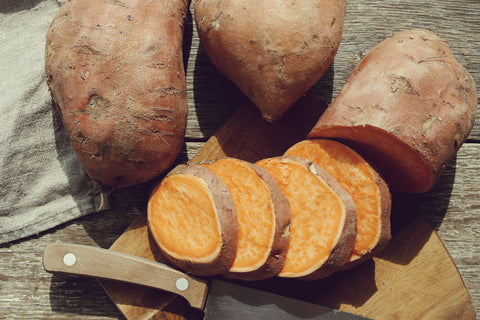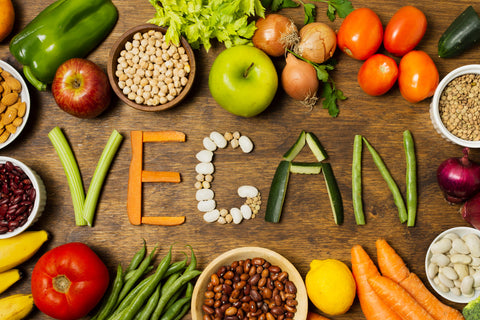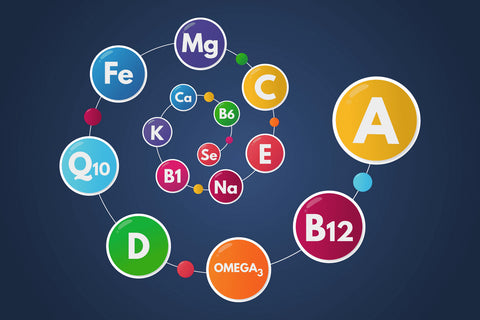Sweet potatoes are a nutritious food that can help prevent Vitamin deficiencies, particularly when they are part of a balanced and varied diet. Sweet potatoes are a good source of several essential Vitamins and Minerals.
Sweet potatoes are rich in beta-carotene (a predecessor to Vitamin A). Vitamin A is crucial for maintaining good vision, a healthy immune system and proper functioning of the heart, lungs and kidneys.
They contain Vitamin C, which is important for immune system support, skin health, and wound healing.
Vitamin B6 contributes to healthy brain development and function and the production of neurotransmitters. Sweet potatoes provide a source of Vitamin B6.
Sweet potatoes are a good source of Potassium, an essential Mineral that helps regulate high blood pressure and maintain proper muscle and nerve function.
While not a Vitamin or Mineral, the fibre in sweet potatoes aids digestion and can contribute to overall health by promoting a feeling of fullness and potentially preventing overeating.
Sweet potatoes are a nutritious food, and they can help prevent nutrient deficiencies when incorporated into your diet as part of a balanced and varied nutritional plan.
When consuming sweet potatoes, you should try to:
-
Use Different Cooking Methods: Enjoy them in various forms, such as baked, mashed, roasted, or even in soups and stews.
-
Balanced Meals: Include sweet potatoes in balanced meals that feature a mix of macronutrients (carbohydrates, proteins, and fats) to provide a well-rounded source of energy and nutrients.
-
Pair with Protein: Combine sweet potatoes with protein sources like lean meats, poultry, fish, tofu, legumes, or dairy products to ensure you get sufficient protein for muscle health and overall nutrition.
-
Add Leafy Greens: Pair sweet potatoes with leafy greens like spinach or kale, as they are rich in Vitamins and Minerals, particularly Iron and Calcium, which sweet potatoes lack.
-
Include Other Vegetables: Include other colourful vegetables to ensure a variety of nutrients. Different vegetables provide different Vitamins and Minerals, so having a rainbow of veggies on your plate is a great way to prevent deficiencies.
-
Incorporate Whole Grains: Combine sweet potatoes with whole grains like brown rice, quinoa, or whole wheat products to increase your intake of fibre, Vitamins and Minerals.
-
Healthy Fats: Incorporate healthy fats like avocado, nuts, and olive oil to enhance the absorption of Vitamin A found in sweet potatoes.
-
Avoid Overcooking: Cook sweet potatoes in a way that preserves their nutrients. Boiling, steaming, or baking them is better than deep frying, as deep frying can deplete some of the nutrients.

Preventing nutrient deficiency involves maintaining a balanced and varied diet that provides your body with the essential Vitamins and Minerals it needs.
Here are some general tips to help prevent nutrient deficiencies:
-
Eat a Varied Diet: Consume a wide variety of foods from all food groups, including fruits, vegetables, whole grains and lean proteins. Different foods provide different nutrients.
-
Portion Control: Monitor portion sizes to ensure you're not overeating or undereating. Balance is key.
-
Monitor Nutrient Intake: Pay attention to your diet to ensure you're meeting your nutrient needs. You can use nutrition tracking apps or consult with a registered dietitian if needed.
-
Limit Processed Foods: Processed and fast foods often lack essential nutrients and can contribute to deficiencies if consumed in excess.
-
Supplementation: In some cases, supplementation may be necessary. For example, if you have a specific dietary restriction, malabsorption issues, or a medical condition that affects nutrient absorption, your doctor may recommend supplements.
-
Stay Hydrated: Proper hydration is essential for overall health. Water helps transport nutrients to cells and aids in digestion.
-
Consider Special Dietary Needs: If you have special dietary needs such as being vegetarian or vegan, you may be prone to nutrient deficiencies including Vitamin B12, Iron, and Calcium.
-
Know Your Body: Pay attention to any signs of nutrient deficiency, such as fatigue, weakness, changes in skin or hair, and digestive issues. If you suspect a deficiency, consult a healthcare professional.
-
Understand Essential Nutrients: Learn about essential nutrients your body needs, such as vitamins (e.g., A, B, C, D, E, and K), minerals (e.g., iron, calcium, potassium), protein, carbohydrates, and fats. Each nutrient plays a crucial role in maintaining good health.
-
Regular Health Check-Ups: Periodic health check-ups can help identify any deficiencies or imbalances. Your healthcare provider can recommend specific tests to check nutrient levels.
-
Read Labels: Be conscious of what you are consuming. Nutritional labels on packaged foods can provide essential information about the nutrients they contain.
-
Manage Stress: Chronic stress can affect your body’s ability to absorb and use nutrients. Practice stress management techniques such as meditation, yoga, or exercise.
-
Specific Needs: Certain groups, such as pregnant women, the elderly, or those with specific health conditions, may have different nutritional requirements. Consider tailored dietary plans or supplements as recommended by healthcare professionals.
-
Avoid Excessive Alcohol and Smoking: Both alcohol and smoking can interfere with nutrient absorption and metabolism. Limit or avoid these habits.
Although sweet potatoes can be beneficial in preventing certain Vitamin deficiencies, it's important to remember that a well-rounded diet with a variety of foods is the best way to ensure you get all the necessary Vitamins and Minerals your body needs.
Relying solely on sweet potatoes, or any single food, is not a good strategy to prevent deficiencies. A balanced diet that includes a mix of fruits, vegetables, lean protein and whole grains is the best approach to maintaining good nutritional health.
If you have concerns about Vitamin deficiencies or specific dietary requirements, it's always a good idea to consult with a healthcare professional or a registered dietitian who can provide personalised advice based on your individual needs and health status.
Related Articles
- Key Nutritional Deficiencies and How to Prevent Them – HealthAid®
- Soil Depletion and The Need Of Nutritional Supplements – HealthAid®
Sources
- Sweet Potato Nutrition, Benefits, Recipes and Side Effects - Dr. Axe (draxe.com)
- 6 Surprising Health Benefits of Sweet Potatoes (healthline.com)
- Sweet Potatoes 101: Nutrition Facts and Health Benefits (healthline.com)
- Sweet potato (Ipomoea batatas [L.] Lam)--a valuable medicinal food: a review - PubMed (nih.gov)
Image by Freepik, Image by Racool_studio on Freepik
Any information or product suggested on this website is not intended to diagnose, treat, cure, or prevent any medical condition. Never disregard medical advice or delay in seeking it because of something you have read on this website. Consult your primary healthcare physician before using any supplements or making any changes to your regime.




